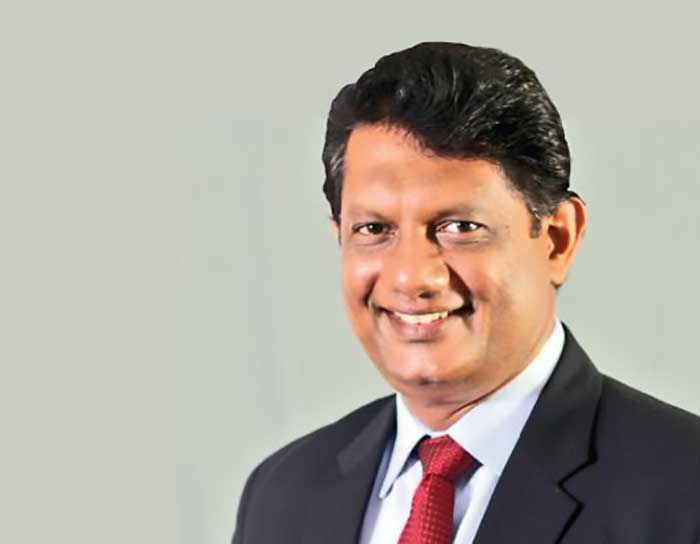News
Budget lacks creative solutions and exacerbates existing crisis – Dr. Godahewa

Budget 2024 is like a fairy tale rather than a pragmatic solution to pressing economic issues, SLPP MP Dr. Nalaka Godahewa has said.
Taking part in the current budget debate, former State Minister said: “Two paramount challenges loom large—the persistent economic contraction and the escalating national debt. A practical budget should provide answers to these challenges, addressing how the government plans to revitalize the economy and escape the debt trap. Unfortunately, the 2024 Budget falls short, lacking creative solutions and potentially exacerbating existing conditions.
The government, once again, presents optimistic revenue targets, reminiscent of the previous year. A notable income shortfall in 2023 raises concerns about the feasibility of the projected 45% increase in revenue for 2024, especially given the ongoing economic contraction. The Budget seems to harbor unrealistic expectations, and if history is any guide, the actual revenue may fall short, as evidenced by the 17% income deficit in 2023.
The Budget’s approach to expenditure compounds the issue. Despite potential revenue shortfalls, government expenditure for 2024 is estimated at 6978 billion rupees, reflecting a substantial 34% increase from the latest estimates of 2023. To meet revenue targets, the government resorts to tax hikes, exemplified by the recent VAT increase from 15% to 18%, affecting essential goods like fuel, electricity, and telephone charges.
This tax-heavy approach, a commonly accepted economic principle, can discourage entrepreneurs, decrease investments, and lead to tax evasion. Such consequences contribute to the 17% income deficit in 2023 and may persist in the coming year, rendering the 45% revenue increase target for 2024 unrealistic.
The Budget gap, arising when government revenue falls short of expenditure, is projected to be Rs 2851 billion in 2024. Bridging this gap through further borrowings or printing money is not a sustainable solution, particularly if the borrowed funds are directed toward consumption rather than income-generating development activities.
The breakdown of government expenditure for 2024 reveals a disproportionate focus on recurrent expenditure (Rs 5345 billion) compared to capital expenditure (Rs 1209 billion). This reflects an 11% increase in recurrent expenditure and a 1% decrease in capital expenditure for 2024. Despite promises to prioritize education and human capital development, the budgeted expenditure on education remains stagnant, and expenditure on women and social empowerment is halved.
The looming tax interest of Rs 2,634 billion, almost half of total recurring expenses, underscores the severity of the situation. Excessive borrowings have led the country into this crisis, and the trend continues, with the 2024 Budget proposing to borrow nearly Rs 3 trillion, exacerbating the existing debt burden.
The President’s grand ideas, articulated in the three main pillars of economic recovery—export-oriented competitive economy, environmentally friendly green and blue economy, and a digital economy—have not seen substantial progress after a year. The lack of consistency, evident in the shift towards a gig economy in the latest Budget, is a persistent issue.
Public trust in the government’s economic management and budgetary proposals has eroded. Citizens’ immediate concerns revolve around basic needs, rising utility bills, and the disparity between lofty economic goals and daily struggles. The prevailing crisis demands a unified and committed leadership capable of delivering tangible results.
The lack of coordination between ministries further compounds the challenges. Conflicting government actions, such as advocating for investment while raising production costs, or acknowledging the importance of the small and medium sector while undermining local producers through imports, highlight the need for cohesive decision-making.
To navigate the crisis successfully, the country requires a clear agenda, a consensus-driven roadmap led by competent leaders for effective implementation. Setting clear priorities with measurable targets in crucial areas like tax collection, tourism, export development, renewable energy, and foreign direct investment is imperative.
The proposed Budget for 2024, if implemented, not only fails to address critical issues but may exacerbate economic challenges. The country urgently needs a comprehensive economic development plan with clear goals, timelines, and accountability measures. The government must redirect its focus toward reactivating the economy, strengthening the export sector, fostering tourism, supporting small and medium businesses, attracting new investments, and addressing the root causes of the economic downturn.
In conclusion, at this darkest hour, a collective and committed leadership is essential to guide the nation out of the crisis. The time for experiments and ad hoc solutions has passed. It’s time for an integrated economic development plan to rebuild the country.”
News
CEB trade unions hint at stringent industrial action after talks fail

Trade unions of the Ceylon Electricity Board (CEB), backed by the powerful Ceylon Electricity Board Engineers’ Union, have warned of accelerated trade union action following the collapse of crucial discussions held on Monday (16) with the CEB Chairman, who also serves as Secretary to the Ministry of Power and Energy.
The issue is expected to take centre stage at today’s press conference, with unions signalling that a token strike, possibly a 12-hour countrywide action, could be staged next week unless authorities urgently intervene.
The meeting earlier this week ended without what union representatives described as any “positive or constructive outcome.”
Trade union leaders expressed disappointment that their key concerns had not been substantively addressed during discussions with the Chairman.
At the heart of the dispute is the unions’ demand for a collective agreement in accordance with Section 18(j) of the Sri Lanka Electricity Act No. 36 of 2024. Trade union representatives maintain that the law provides for structured engagement between management and employees and that a formal collective agreement is necessary to ensure transparency and industrial stability within the institution.
The unions also submitted what they termed a reasonable proposal to safeguard the CEB Employees’ Provident Fund (EPF), voicing concerns over the long-term security of workers’ retirement benefits.
However, according to trade union sources, those proposals were not adequately taken up during the discussions.
A senior electrical engineer told The Island that further internal consultations were being held to decide the next course of action. “There is growing frustration among employees. The issues raised are fundamental and relate directly to statutory compliance and the financial security of staff,” he said.
The Island learns that unless there is meaningful engagement from the authorities, the proposed token strike could mark the beginning of more stringent industrial action.
Energy sector observers warn that any escalation of trade union unrest at the CEB could have serious implications for the country’s power sector stability at a critical time.Further developments are expected following today’s media briefing.
By Ifham Nizam
News
PM reveals allowances and perks available to MPs

Prime Minister Dr. Harini Amarasuriya yesterday (19) revealed allowances and benefits provided to Members of Parliament at present.She did so while responding to a question raised by Samagi Jana Balawegaya MP Chaminda Wijesiri.
According to the disclosure:
An MP receives a monthly allowance of Rs. 54,285, with an entertainment allowance of Rs. 1,000 per month.
Driver allowance is Rs. 3,500 per month; however, if the MP is provided with a driver by the Ministry of Public Security and Parliamentary Affairs, no driver allowance is paid.
Telephone allowance is Rs. 50,000, while transport allowance is Rs. 15,000 per month.
Office allowance amounts to Rs. 100,000.
MPs attending parliamentary sessions receive Rs. 2,500 per day, while Rs. 2,500 per day are given for MPs attending committee meetings on non-sitting days.
Meanwhile, Members of Parliament also receive a fuel allowance based on the distance from their elected district to Parliament.
For national list MPs, this is calculated as 419.76 liters of diesel per month, paid at the approved market rate on the first day of each month.Dr. Amarasuriya also emphasised that these allowances are structured to cover official duties and transportation costs.
News
CID expresses regret to Natasha; IGP to issue guidelines on ICCPR arrests

Former OIC of the Cyber Crime Investigation and Intelligence Analysis Unit of the CID, M.M.U. Subhasinghe, yesterday expressed his regret in writing to civil activist and comedian Natasha Edirisooriya at the Supreme Court regarding her arrest under the International Covenant on Civil and Political Rights (ICCPR) Act.
The Attorney General’s Department, appearing on behalf of the respondents, informed the court that the IGP would issue a set of guidelines via a circular to all police officers to prevent unlawful arrests under this Act in the future. It was further noted that the circular would be issued within two weeks, and the petitioner, Natasha Edirisooriya, has examined and agreed to these guidelines.
These submissions were made yesterday before a three-judge bench of the Supreme Court, led by Chief Justice Preethi Padman Surasena, during the hearing of the Fundamental Rights (FR) petition filed by Edirisooriya challenging her unlawful arrest.
Following these developments, the court ordered the respondents to inform the court via a motion within two weeks of issuing the IGP’s circular and ordered the conclusion of the case proceedings.
Natasha Edirisooriya was present in open court yesterday. Addressing her, Chief Justice Surasena stated that the court appreciates the manner in which the legal proceedings were brought to a conclusion.
The letter expressing regret stated: “As the arresting officer, considering the totality of circumstances, I wish to express deep regret to you for the arrest on 27th May 2023 and your incarceration in remand custody till 5th July 2023 consequent thereto. I also extend my deep regret regarding the damage that may have been caused to your reputation and dignity, and mental and emotional trauma caused by the arrest and incarceration.”
The respondents agreed to express this regret and issue the circular based on the specific conditions put forward by Edirisooriya in consultation with her counsel Suren Fernando and the legal team.
By AJA Abeynayake
-

 Life style5 days ago
Life style5 days agoMarriot new GM Suranga
-

 Business4 days ago
Business4 days agoMinistry of Brands to launch Sri Lanka’s first off-price retail destination
-

 Features5 days ago
Features5 days agoMonks’ march, in America and Sri Lanka
-

 Features5 days ago
Features5 days agoThe Rise of Takaichi
-

 Features5 days ago
Features5 days agoWetlands of Sri Lanka:
-

 News5 days ago
News5 days agoThailand to recruit 10,000 Lankans under new labour pact
-

 News5 days ago
News5 days agoMassive Sangha confab to address alleged injustices against monks
-

 Sports1 day ago
Sports1 day agoOld and new at the SSC, just like Pakistan

























